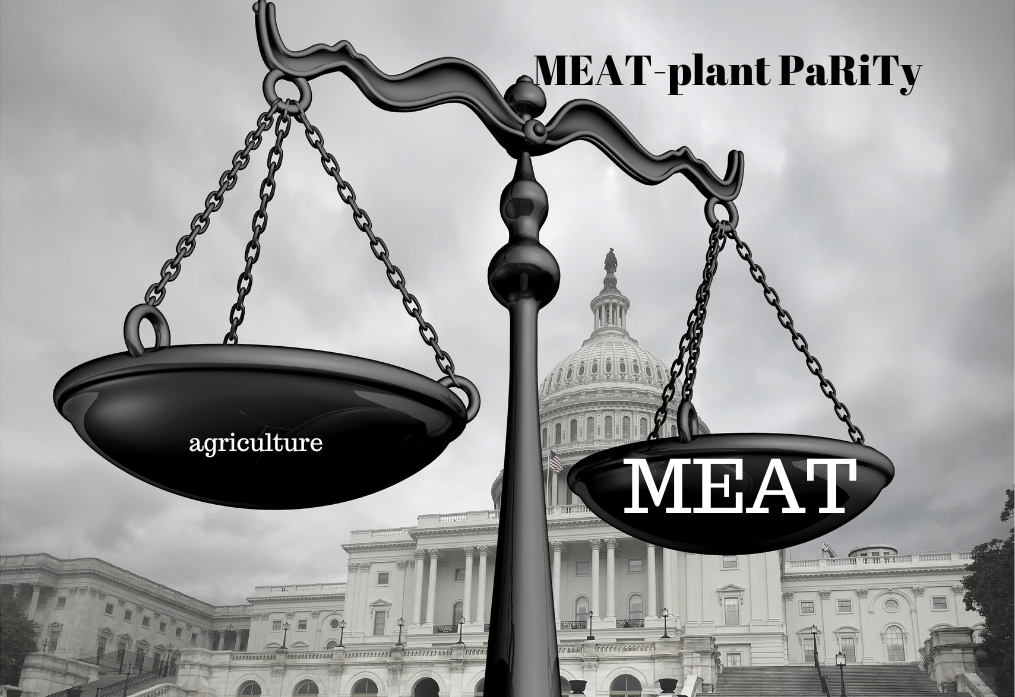Meat-plant parity is a concept that aims to balance the scales of food production between meat and plant-based foods. It seeks to ensure that both types of food production receive equal attention, resources, and policy support. The blog post delves into the importance of meat-plant parity, emphasizing its crucial role in fostering a sustainable future.
Why Is Meat Subsidized and Not Produce?
The current system of subsidies for meat production is a legacy of historical agricultural policies. Meat subsidies ensure a stable food supply, as meat has been traditionally seen as a staple food. Growing recognition of meat production’s environmental and health impacts necessitates rebalancing our food system.
The Loss from Spoilage:
Produce has a higher spoilage risk than meat, but meat’s environmental impact far exceeds spoilage losses. Improved storage and distribution can mitigate spoilage.
Why Meat-Plant Parity Matters:
- Environmental Impact: Meat production has a significant environmental impact, contributing to deforestation, greenhouse gas emissions, and water pollution. Plant-based agriculture is generally more sustainable, requiring less land, water, and energy to produce the same amount of food. Plant-based diets associate with lower greenhouse gas emissions and reduced land use, making them a more environmentally friendly option. Choosing plant-based foods over meat, individuals can help reduce their carbon footprint and contribute to a more sustainable food system.
- Health Benefits: Plant-based diets are linked to lower risks of chronic diseases such as heart disease, diabetes, and certain cancers. By promoting plant-based foods, we can contribute to better public health and reduce the burden of chronic diseases. Education, awareness campaigns, and policy changes can promote plant-based food availability and affordability. Healthcare professionals can advocate plant-based diets, emphasizing health benefits. Healthcare professionals can advocate plant-based diets, emphasizing health benefits. By making plant-based foods more accessible and appealing, we can help individuals make healthier choices and improve their overall well-being.
- Global Food Security: Plant-based agriculture addresses global food security challenges by using land and water more efficiently. This makes it a more sustainable option for feeding a growing global population. Promoting plant-based diets reduces food production’s environmental impact and fosters resource equity. Supporting plant-based agriculture addresses food scarcity and malnutrition, particularly in developing countries. Choosing plant-based foods over meat enhances global food security and sustainability
What Changes the Government Should Make:
- Subsidies: Currently, meat production is heavily subsidized, while plant-based agriculture receives far less support. The government should consider shifting subsidies towards more sustainable plant-based agriculture.
- Research Funding: Research on alternative protein sources, like plant-based and lab-grown meat, needs more funding for sustainable food production.
- Policy Support: Implement policies promoting plant-based food consumption, including restaurant incentives and labeling schemes for informed consumer choices.
Why Is Meat Subsidized and Not Produce?
The current system of subsidies for meat production has its roots in historical agricultural policies. These policies aimed to support domestic meat production, considering meat a staple food.
Our evolving understanding of meat production’s environmental and health impacts prompts a growing recognition and need for food system rebalancing.
The environmental impact of meat production outweighs the spoilage risk of produce, despite its higher likelihood of spoilage. Improved storage and distribution systems can help mitigate food waste.

The Carbon Footprint:
Produce’s carbon footprint is lower than meat’s due to plant-based agriculture’s more resource-efficient use. Plant-based agriculture generally requires less land, water, and energy compared to meat production. Plants convert energy and nutrients more efficiently, needing less land and water for the same food yield as meat. Plant-based agriculture often emits fewer greenhouse gases, as plant-based foods generally have lower carbon emissions than animal-based foods.
Meat production, is associated with a range of environmental impacts that contribute to its higher carbon footprint. Deforestation arises from clearing land for livestock farming and feed production, posing a significant environmental challenge. This leads to the release of carbon stored in trees, further contributing to greenhouse gas emissions. Additionally, methane emissions from livestock, particularly ruminant animals like cattle, are a major source of greenhouse gases. Methane is a potent greenhouse gas, with a much higher warming potential than carbon dioxide over a short time frame. Finally, meat production requires intensive use of water and feed, both of which have environmental consequences.
Overall, plant-based agriculture typically has a lower carbon footprint than meat, promoting meat-plant parity and sustainability. Choosing plant-based foods helps individuals reduce their carbon footprint, fostering a sustainable food system.

Agriculture and Global Warming:
Plant-based agriculture can significantly mitigate global warming by reducing greenhouse gas emissions and preserving natural habitats. It minimizes carbon release from deforestation, maintaining Earth’s carbon absorption capacity unlike meat production, a major deforestation contributor. Generally, plant-based foods require less land, water, and energy than meat production, making them a more sustainable option.
Meat production, however, contributes to a range of environmental impacts that exacerbate global warming.
Promoting plant-based agriculture, supporting alternative protein sources, and encouraging plant-based food consumption contributes to a healthier, eco-friendly future. This leads to the release of carbon stored in trees, further contributing to greenhouse gas emissions. Additionally, methane emissions from livestock, particularly ruminant animals like cattle, are a significant source of greenhouse gases. Methane is a potent greenhouse gas, with a much higher warming potential than carbon dioxide over a short time frame.
Plant-based agriculture offers a sustainable alternative to meat production, mitigating global warming and preserving natural habitats. Choosing plant-based foods over meat helps individuals reduce their carbon footprint and contribute to a more sustainable food system.
Conclusion: Meat-plant parity is crucial for creating a more sustainable and balanced food system.
Promoting plant-based agriculture, supporting alternative protein sources, and encouraging plant-based food consumption contributes to a healthier, eco-friendly future.













